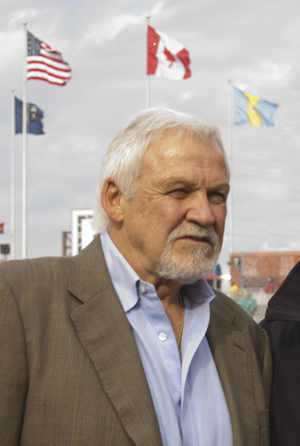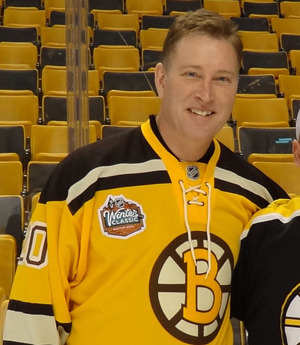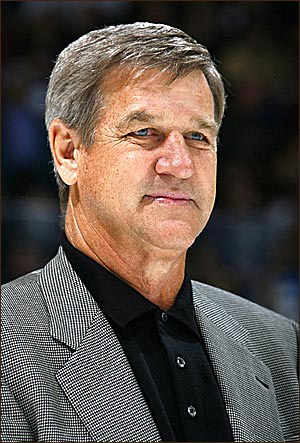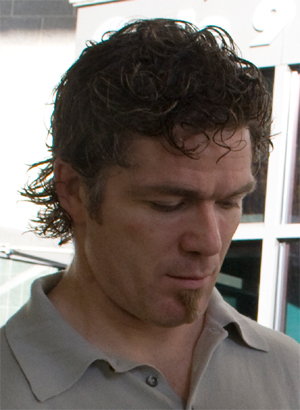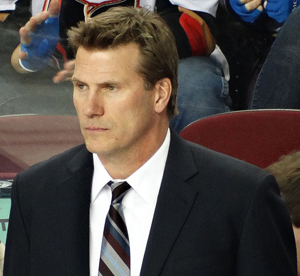
Joel Otto was never drafted, and upon graduation, sought opportunities from National Hockey League (NHL) clubs. The teams he contacted offered only a try-out, some insisting he pay his own way. Finally, his agent contacted Cliff Fletcher, general manager of the Calgary Flames, who offered him a contract to play for the Moncton Golden Flames, their American Hockey League (AHL) affiliate. Otto agreed, scored 63 points in 56 games for the Golden Flames in the 1984–85 AHL season and appeared in 17 games with Calgary. He made his NHL debut on November 23, 1984, against the St. Louis Blues. On March 1, 1985, he recorded his first point, an assist, against the Montreal Canadiens. He scored his first goal two nights later against goaltender Darren Eliot of the Los Angeles Kings. Otto established himself as a top defensive forward for the Flames in 1985–86. Coach Bob Johnson discovered his niche when he had Otto shut down Marcel Dionne, the top player of the Los Angeles Kings. Afterward, Otto was consistently used against the opposition's top line where he used his size and faceoff ability to his advantage. He was most famous for shadowing Mark Messier of the Edmonton Oilers when the Battle of Alberta reached its peak in the late 1980s. Otto later remarked that Messier was the reason he was in the NHL, as the Flames needed a big center who could match Messier physically, especially in the faceoff circle. Johnson also used Otto in front of the opposition net to screen the goaltender. He struggled offensively early in the 1985–86 season, scoring only two goals in the first third of the year, but as he grew in confidence and saw increasing ice time, his offense improved. Otto finished the season with 25 goals and 59 points. He added 5 goals and 15 points in the playoffs as the Flames reached the Stanley Cup final. The Flames lost the series in five games to the Montreal Canadiens. Continuing to chip in on offense in the following seasons, Otto scored at least 50 points in each of his first four full seasons. He reached the 20-goal mark for the second time in 1988–89, a season he ended on an 11-game point scoring streak. The Flames entered the 1989 Stanley Cup Playoffs as the top team in the NHL, and a prohibitive favorite against their first round opponent, the Vancouver Canucks. Nonetheless, the Canucks forced the Flames into overtime of the seventh and deciding game of the series. Late in the first overtime period, Otto rushed toward the net as Jim Peplinski carried the puck up the right side boards. Peplinski's shot deflected off Otto's skate and past Vancouver goaltender Kirk McLean. Otto was credited with the series-winning goal. He scored a total of 19 points in 22 playoff games as the Flames won their first Stanley Cup championship in franchise history. Considered one of the league's best faceoff men and a top two-way forward, Otto was frequently the subject of inquiries by other teams in trade talks, which the Flames refused. He scored his 100th career goal on October 30, 1990, against the New Jersey Devils and his 300th point on October 4, 1991, against Edmonton. He was the Flames' nominee for the Bill Masterton Memorial Trophy in 1991–92, a league award given for dedication and perseverance. His role with the Flames changed into the 1990s as the team placed greater emphasis on his defensive play into the 1990s, though he surpassed 50-points for the fifth time in 1992–93. Otto was also named a finalist for the Frank J. Selke Trophy as the league's top defensive forward that season. He was again named a finalist for the Selke Trophy in 1994–95. Otto hoped to remain in Calgary after his contract expired following the 1995 season, but with the Flames facing financial difficulties as the NHL's salary structure rapidly changed, the team was unable to agree to a new contract. He was among the most sought after players in free agency, and was pursued by the New York Rangers, who hoped that he could help their team shut down Eric Lindros of the Philadelphia Flyers. Otto considered the offer, and thought if the Rangers thought that highly of their opponent, he would be better off playing with Lindros than against him. Otto signed a three-year contract with the Philadelphia Flyers on July 21, 1995. He scored 41 points in 67 games in 1995–96, including the 500th of his career, when he notched a goal and an assist in a 5–4 win over the Edmonton Oilers on March 13, 1997. Still regarded as one of the league's top defensive centers in 1996–97, Otto helped the Flyers reach the 1997 Stanley Cup Finals, which they lost to the Detroit Red Wings. He scored only 7 points in 68 games in 1997–98 after recording 32 the season before, and had lost some of his skating speed. Following the season, Otto announced his retirement. Otto made his debut with the United States national team at the 1985 World Ice Hockey Championships. He appeared in ten games, scoring two goals. His goal against Czechoslovakia helped the US complete its third of three consecutive upset victories, including defeats of Canada and Sweden, that left the United States in second place after the preliminary round. The Americans ultimately finished fourth in the tournament.[23] Otto played in a second World Championship in 1990, scoring six points in nine games for the fifth-place Americans. The 1987 Canada Cup was Otto's first appearance in a best-on-best tournament. He appeared in five games for the fifth-place Americans, and returned as the captain of the American squad that entered the 1991 Canada Cup. Otto scored two goals in a 7–3 victory over Finland in the semi-final to lead the United States into its first championship game in five Canada Cup appearances. The Americans lost the best-of-three final to Canada 2–0. Otto next appeared in the 1996 World Cup of Hockey, the successor tournament to the Canada Cup, where the Americans again faced Canada in the final. Otto and his teammates defeated Canada to claim the inaugural World Cup title. His final international appearance came at the 1998 Winter Olympics. At 36, Otto was the oldest player on the American team and was counted on to contribute to the American team as a checking center. He appeared in four games for the sixth-place Americans.
